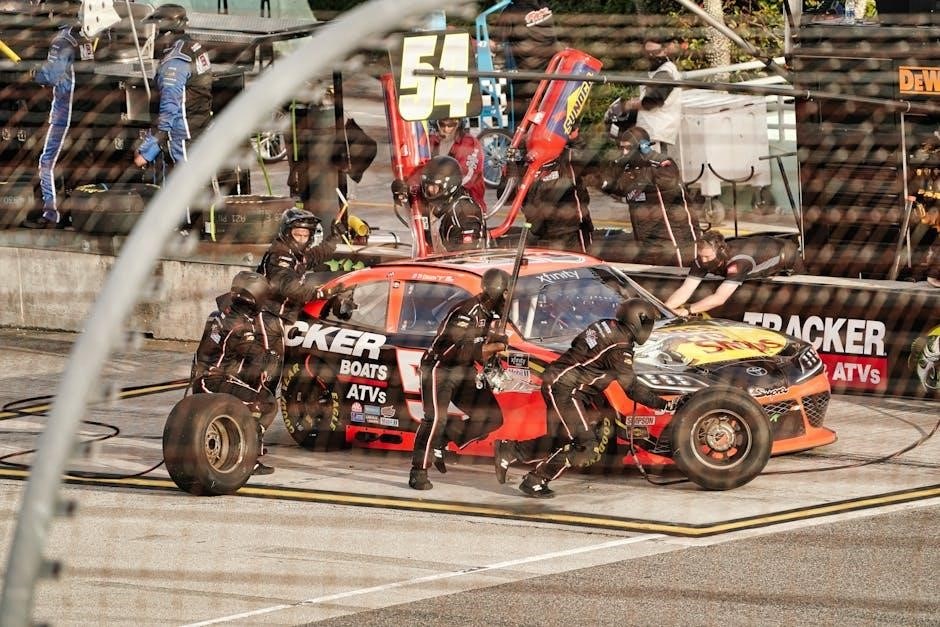
A mechanics lien is a legal tool in Florida ensuring contractors and suppliers receive payment for work on properties, providing a structured process for resolving payment disputes.
1.1. Definition and Purpose of a Mechanics Lien
A mechanics lien is a legal remedy in Florida that allows contractors, subcontractors, and suppliers to place a lien on a property when they are not paid for their work or materials. Its purpose is to ensure payment for services rendered and protect the rights of those who contribute to a property’s improvement, providing a structured path for resolving payment disputes through the courts.
1.2. Legal Framework Governing Mechanics Liens in Florida
The legal framework for mechanics liens in Florida is primarily governed by Chapter 713 of the Florida Statutes. These laws outline the requirements, procedures, and rights associated with filing and enforcing liens. The statutes ensure a structured process for resolving payment disputes in construction projects, providing clarity and protection for all parties involved, including contractors, subcontractors, and property owners.
The Mechanics Lien Filing Process in Florida
Filing a mechanics lien in Florida involves specific legal steps, including preparing the lien document, notarizing it, and recording it with the county clerk of court.
2.1. Step-by-Step Guide to Filing a Mechanics Lien
Filing a mechanics lien in Florida requires preparing the lien document, notarizing it, and recording it with the county clerk. Serve notice to the property owner within 30 days. Ensure all legal requirements are met to avoid dismissal. Missing deadlines or procedural errors can invalidate the lien, so proper documentation and timely submission are crucial for enforcement.
2.2. Required Documentation and Forms
To file a mechanics lien in Florida, specific documentation is necessary. This includes a completed and notarized Claim of Lien form, a detailed description of the work performed, proof of service, and a signed affidavit. Additionally, copies of contracts, invoices, and any relevant communication with the property owner should be submitted. Proper formatting and adherence to legal standards are essential for the lien to be valid.
Eligibility to File a Mechanics Lien in Florida
Eligibility to file a mechanics lien in Florida applies to contractors, subcontractors, and suppliers who have not been paid for labor, materials, or services provided.
3.1. Who Can File a Mechanics Lien?
In Florida, mechanics liens can be filed by contractors, subcontractors, and suppliers who have provided labor, materials, or services for property improvement but remain unpaid. This includes licensed professionals like architects and engineers. The lien must be filed within specific timelines and adheres to statutory requirements to ensure enforceability and protect the claimant’s rights effectively.
3.2. Types of Projects Covered Under Florida Mechanics Lien Law
Florida mechanics lien law applies to construction projects, including building improvements, renovations, and infrastructure developments. It covers public and private projects, protecting contractors, subcontractors, and suppliers who provide labor, materials, or services. This ensures payment for work performed on real property, maintaining fairness in the construction industry by securing payment rights for all parties involved effectively.
Key Components of a Florida Mechanics Lien Document
A Florida mechanics lien document must include the claimant’s information, property description, amount owed, and a detailed description of the work performed or materials supplied, ensuring accuracy and compliance with state laws to enforce payment rights effectively and maintain legal validity in court proceedings.
4.1. Essential Information to Include
A Florida mechanics lien document must include the claimant’s name, property owner’s details, property description, amount owed, and a detailed description of the work performed or materials supplied. Proper formatting, notarization, and compliance with Florida Statutes are critical to ensure the lien’s enforceability and validity, as outlined in official state publications and legal guides.
4.2. Formatting and Structural Requirements
The mechanics lien document must adhere to strict formatting guidelines, including specific font sizes, margins, and sections. It should be notarized and recorded in the county where the property is located. Compliance with Florida Statutes, such as Chapter 713, is essential to ensure the lien’s validity and enforceability, as detailed in official state publications and legal guides.
Filing Deadlines and Time Constraints
Florida mechanics liens must be filed within strict deadlines, typically 90 days from the last furnishing of labor or materials. Timely filing is crucial to maintain lien rights.
5.1. Timelines for Filing a Mechanics Lien in Florida
In Florida, a mechanics lien must generally be filed within 90 days from the last date of furnishing labor, services, or materials to the project. This strict deadline ensures timely resolution of payment disputes and protects the rights of contractors and suppliers. Failure to meet this timeline can result in the loss of lien rights, emphasizing the importance of prompt action.
5.2. Consequences of Missing Filing Deadlines
Missing the filing deadline for a mechanics lien in Florida results in the loss of lien rights, reducing a contractor’s ability to secure payment. This can leave claimants with limited recourse, potentially forcing them to rely on other legal remedies. The strict enforcement of deadlines underscores the importance of timely action to preserve legal rights and financial interests in construction projects.

Mechanics Lien Enforcement and Foreclosure
Enforcement involves legal actions to ensure payment, potentially leading to property foreclosure to settle debts, providing a structured process for resolving unpaid claims through judicial procedures.
6.1. Legal Process for Enforcing a Mechanics Lien
The legal process for enforcing a mechanics lien in Florida involves filing a lawsuit in court, serving the defendant, and proving the validity of the lien claim. The court reviews the claim, ensuring compliance with state laws and proper documentation. If upheld, the lien is enforced, potentially leading to foreclosure to satisfy unpaid debts, following Florida’s legal framework for lien enforcement.
6.2. Foreclosure Proceedings and Potential Outcomes
Foreclosure proceedings in Florida mechanics lien enforcement involve court-supervised property sales to satisfy unpaid claims. If the lien remains unpaid, the court may order the property sold, with proceeds allocated to lienholders. Potential outcomes include full payment, partial recovery, or property transfer to the lienholder. Proper legal representation is crucial for all parties involved in these complex proceedings to protect rights.
Related Legal Concepts and Instruments
Explore how tax liens and UCC financing statements interact with mechanics liens in Florida, providing a comprehensive understanding of their roles in securing payments and property interests.
7.1. Tax Liens and Their Interaction with Mechanics Liens
Tax liens in Florida prioritize government claims over mechanics liens, often taking precedence in property sales. This can complicate payment recovery for contractors, as tax liens may reduce available funds. Understanding their interaction is crucial for navigating lien enforcement and ensuring fair payment distribution. Proper legal guidance helps mitigate potential conflicts between these liens.
7.2. UCC Financing Statements and Mechanics Liens
UCC financing statements and mechanics liens serve distinct purposes but can intersect in securing payment rights. While UCC statements perfect security interests in collateral under the Uniform Commercial Code, mechanics liens protect unpaid labor and materials. Their interaction affects lien priority, with UCC filings potentially influencing the order of payment in property transactions. Understanding both is vital for ensuring payment rights are safeguarded effectively in Florida.

Common Mistakes to Avoid When Filing a Mechanics Lien
Common mistakes include missing filing deadlines, incorrect property descriptions, and improper documentation. Ensuring accuracy and timeliness is crucial to maintain lien validity in Florida.
8.1. Errors in Documentation and Filing
Common errors include missing deadlines, incorrect property descriptions, and improper notarization. Ensuring all required forms, such as the Notice of Commencement, are accurately completed is vital. Additionally, failing to include detailed descriptions of work performed or materials supplied can invalidate a lien. Proper documentation and adherence to Florida’s specific filing requirements are essential to avoid dismissal of the lien claim.
8.2. Procedural Mistakes and Their Implications
Procedural errors, such as failing to serve the lien or missing deadlines, can lead to dismissal. Incorrectly identifying parties or properties may invalidate claims. Non-compliance with Florida’s lien laws can result in loss of payment rights. Ensuring adherence to procedural requirements is crucial to maintaining enforceability and avoiding legal setbacks for contractors and suppliers.
Impact on Property Owners and Contractors
Mechanics liens protect contractors’ payment rights but can burden property owners, potentially affecting property value. Both parties must navigate legal responsibilities to avoid financial or legal consequences;
9.1. Rights and Responsibilities of Property Owners
Property owners in Florida have the right to receive notice of a mechanics lien and to contest its validity. They must address the lien to avoid foreclosure, ensuring payments are properly documented. Owners should understand their legal obligations and seek advice if disputes arise to protect their property interests and financial standing.
9.2. Protections and Obligations for Contractors
Contractors in Florida are protected under mechanics lien laws, ensuring payment for work performed. They must adhere to strict filing deadlines and maintain accurate documentation. Proper notice and compliance with legal procedures are essential for enforcing claims and avoiding disputes. Understanding these obligations is crucial for contractors to safeguard their rights and ensure fair compensation for services rendered.

Recent Legal Developments and Updates
Florida’s mechanics lien laws have seen updates, including legislative changes and judicial interpretations, impacting filing procedures, timelines, and enforcement processes for contractors and property owners.
10.1. Legislative Changes Affecting Mechanics Liens
Recent legislative updates in Florida have clarified mechanics lien filing processes, ensuring stricter adherence to timelines and documentation requirements. These changes aim to streamline disputes and enhance fairness for contractors and property owners.
10.2. Case Law and Judicial Interpretations
Florida courts have issued rulings clarifying mechanics lien enforcement, emphasizing strict compliance with filing deadlines and documentation. Judicial interpretations highlight the importance of proper notice and lien execution, ensuring fairness for contractors and property owners. Recent cases underscore the need for precise adherence to legal standards to avoid disputes and potential lien foreclosures.
Resources for Further Information
Official Florida government publications and legal guides provide detailed insights into mechanics liens, offering comprehensive resources for contractors, property owners, and legal professionals seeking clarification or guidance.
11.1. Official Florida Government Publications
Official Florida government publications, including the Florida Legislature’s website and county clerk records, provide authoritative resources on mechanics liens. These documents include statutes, filing guidelines, and court procedures. The Florida Statutes, particularly Chapter 713, detail lien laws. County clerk websites offer downloadable forms and instructions. These sources ensure compliance and clarity for parties involved in lien processes.
11.2. Legal Guides and Professional Advisories
Legal guides and professional advisories provide in-depth insights into Florida’s mechanics lien laws. Resources from the Florida Bar and construction industry groups offer detailed explanations of lien rights, filing processes, and enforcement strategies. These materials often include practical tips for contractors, subcontractors, and property owners to navigate lien-related issues effectively and avoid legal pitfalls.
Understanding mechanics liens in Florida is crucial for protecting payment rights. Adhering to legal requirements ensures fair compensation and maintains project integrity, avoiding costly disputes.
12.1. Summary of Key Points
A mechanics lien in Florida is a legal remedy for unpaid contractors and suppliers, ensuring payment through property liens. Eligibility varies, but it generally applies to improvements made to real property. The process involves strict deadlines and documentation requirements. Understanding the legal framework, filing procedures, and enforcement mechanisms is essential for protecting rights. Recent legal developments emphasize the importance of adhering to updated laws and procedures to avoid disputes and ensure fair compensation.
12.2. Final Thoughts on Navigating Mechanics Liens in Florida
Navigating mechanics liens in Florida requires careful adherence to legal processes, deadlines, and documentation. Understanding eligibility, filing procedures, and enforcement mechanisms is crucial. Seeking professional advice ensures compliance and avoids costly mistakes. Staying informed about legal updates and best practices helps protect rights and facilitate smooth dispute resolution, balancing the interests of all parties involved effectively.